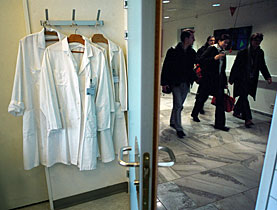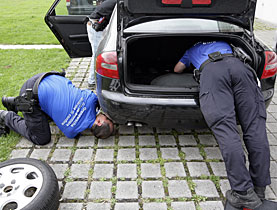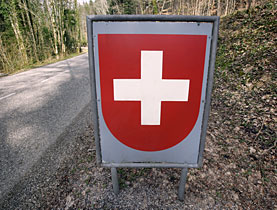Rich world “needs more foreign workers”

The International Organization for Migration (IOM) has called on rich countries to keep open their doors to immigrant workers despite the global economic crisis.
The IOM says that despite the downturn, wealthy states like Switzerland will continue to need foreign workers to fill jobs their shrinking workforces cannot or will not do.
Switzerland hosts the third-largest number of migrants in Europe relative to population size, the Geneva-based intergovernmental body says.
“Switzerland, with its bilateral agreements with the EU, has chosen a specific way of the kind of immigration it wants and needs for the country to continue to prosper,” Erika Laubacher of the IOM in Bern told swissinfo.
“One can’t just say that Switzerland closes the doors, because this is simply not correct,” she said, pointing out the various bilateral accords, migration partnerships and labour opportunities in place in Switzerland.
“At the same time it’s wrong to say that Switzerland will open its doors – it just has a very regulative, well thought through mechanism of what kind of immigration it would like to have in the years to come.”
According to the United Nations Department of Economic and Social Affairs, in 2005 Luxembourg and Liechtenstein had the most migrants relative to population size (37.3 per cent and 33.5 per cent respectively), followed by Switzerland (22.9 per cent) and Latvia and Estonia (19.5 per cent and 15.2 per cent).
Financial crisis
In the IOM’s fourth World Migration Report, it said there are more than 200 million migrants around the world today – two-and-a-half times the number in 1965.
Developed countries compete for highly skilled immigrants, but there is also a growing need for low-skilled workers in rich countries, it said.
Planning immigration is “especially important during downturns in the global economy such as the one we are witnessing today,” said Gervais Appave, one of the editors of the report.
Appave said the Asian financial crisis in the 1990s demonstrated that the need for immigrant workers continued even during times of economic hardship.
Laubacher believed it was too early however to say how the current financial crisis could affect immigration in Switzerland.
“At the moment we just have to see how things develop. We also have to look at different regions – what might affect the irregular migration movements in southeast Asia might be different from Switzerland”, she said.
The Federal Office of Migration also told swissinfo it was too early to speculate on the impact of the economic crisis on illegal immigration.
“Complex”
The IOM’s report said Europe hosted the largest number of immigrants, with 70.6 million people in 2005, the latest year for which figures are available.
North America, with over 45.1 million immigrants, is second, followed by Asia, which hosts nearly 25.3 million.
Most of today’s migrant workers come from Asia and demographic data suggest that by 2030, China and India will provide 40 per cent of the global workforce, the report said.
“There’s always jobs that the host population don’t want to do,” said IOM spokeswoman Jemini Pandya, adding that in many countries, the demand for workers in health care, domestic care and service industries would continue to grow.
Regarding illegal immigration and employment, Laubacher said both were “taken very seriously” by the authorities and measures existed to combat them.
“But it’s very difficult – irregular immigration can include people who stay after their visa runs out or who move on to France, for example, in the asylum process,” she said.
“It’s a very complex phenomenon.”
swissinfo, Thomas Stephens
In 2007 nearly 144,000 foreigners took up residence in the country, an increase of 45 per cent from 2005.
The three cantons with the largest number of permanent foreign residents are Zurich (299,842), Vaud (195,071) and Geneva (163,951).
The three cantons with the largest proportions of foreign residents are Basel City with 33.3 per cent (56,106 people), Schaffhausen with 31.6 per cent (16,323 people), and Basel Country with 29.9 per cent (48,719 people).
Switzerland has eight types of residency permits for non-European Union nationals. Each is assigned a letter. Some of the more common permits include:
A B permit allows foreign nationals to stay in the country for longer periods of time for a specific purpose, with or without gainful employment. It must be renewed each year and is tied to a specific canton.
A C permit, or settlement permit, can be obtained after having a B permit for five to ten years, depending on nationality. It has no restrictions.
A G permit allows residents in neighbouring countries to cross into Switzerland for work. They may work anywhere in Switzerland but must return home at least once a week.
An N permit is granted to those seeking asylum. During the process they are entitled to live in Switzerland and under some cases may work.

In compliance with the JTI standards
More: SWI swissinfo.ch certified by the Journalism Trust Initiative




You can find an overview of ongoing debates with our journalists here. Please join us!
If you want to start a conversation about a topic raised in this article or want to report factual errors, email us at english@swissinfo.ch.